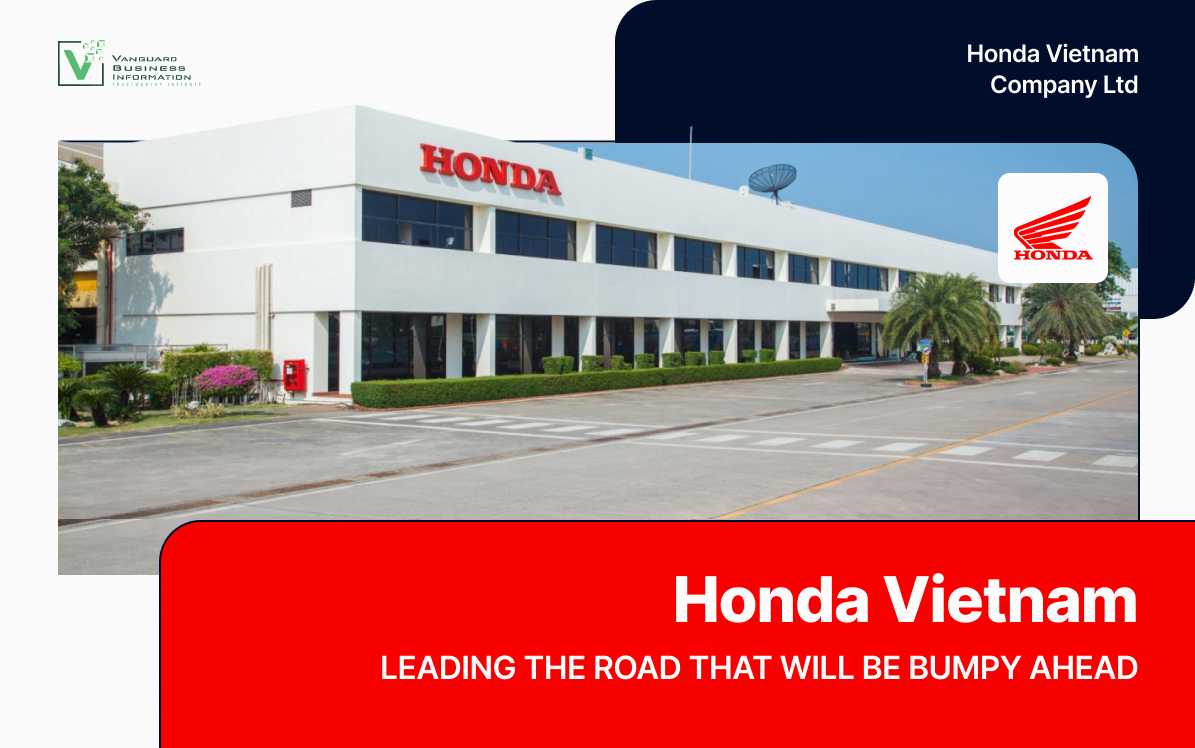Published Oct 2025
HONDA VIETNAM: Leading the road that will be bumpy ahead.
HONDA VIETNAM, the nation’s top motorcycle and automobile maker, remains a symbol of innovation and strength after nearly three decades of market leadership. As Vietnam gears up to ban gasoline motorbikes and embrace electric mobility, Honda faces a bumpy road ahead, yet its solid finances, advanced R&D, and trusted brand put it in the driver’s seat of the country’s transition toward a cleaner, smarter future.

A Legacy of Innovation and Market Leadership
Established in 1996, HONDA VIETNAM COMPANY LTD has evolved from a joint venture into one of Vietnam’s most dominant industrial enterprises, symbolizing innovation, efficiency, and sustainable growth.
Operating under Business ID 2500150543, the company is headquartered in Phúc Thắng Ward, Phúc Yên City, Vĩnh Phúc Province, where it manages two motorcycle plants and one automobile plant. A second primary manufacturing site operates in Dong Văn II Industrial Park, Hà Nam Province, complemented by a branch office in Ho Chi Minh City and a representative office in Hà Nội.
The company’s ownership structure reflects a blend of Japanese precision, Thai regional integration, and Vietnamese industrial policy: Honda Motor Co., Ltd. (Japan) 42%, VEAM, Vietnam Engine & Agricultural Machinery Corporation 30%, and Asian Honda Motor Co., Ltd. (Thailand) 28%. With over 10,000 employees and registered investment capital exceeding USD 530 million, Honda Vietnam remains one of the country's largest manufacturing employers and taxpayers.
From its inception, Honda Vietnam has consistently championed the spirit of “Power of Dreams,” providing mobility solutions that balance performance, efficiency, and environmental responsibility. For over two decades, its ability to integrate cutting-edge global technology with local market understanding has made it the undisputed leader in Vietnam’s motorcycle market.
Financial Strength and Operational Excellence
In the fiscal year ending March 31, 2024, Honda Vietnam reported net sales of USD 4.02 billion, net profit of USD 695.6 million, and total assets of USD 1.38 billion. The company’s equity reached USD 746.3 million, while liabilities stood at USD 635.1 million, demonstrating a robust and conservative balance sheet with no interest-bearing debt.
Even amid market headwinds, Honda maintained a gross margin of 31.1%, EBITDA margin of 23.2%, and net margin of 17.3%, outperforming nearly all regional peers. Its cash and cash equivalents (USD 705 million) covered current liabilities twice, with liquidity ratios (Current Ratio 2.01×, Quick Ratio 1.41×) among the healthiest in Vietnam’s manufacturing sector.
A defining feature of Honda’s financial discipline lies in its cash conversion cycle of only seven days, achieved through efficient inventory management (DOH ~36 days), rapid receivable turnover (DSO ~6 days), and strong supplier payment terms (DPO ~35 days). This operational agility ensures that Honda can withstand fluctuations in raw-material prices, interest rates, and demand cycles without relying on external borrowing.
While revenue in 2024 declined 11.6% year-on-year, mainly due to a temporary drop in domestic motorcycle demand, the company’s profitability and liquidity remained exceptional. Moreover, Honda generated USD 644 million in operating cash flow versus USD 32.5 million in capital expenditures, confirming that even during contractionary periods, it continues to build financial reserves while distributing dividends to shareholders.
Dominance in Two-Wheeler and Automobile Markets
Honda Vietnam is a household name synonymous with reliability and performance. In FY2024, despite softer consumer demand, the company held an 82.5% share of the motorcycle market, selling over 2 million units, while its automobile division delivered 25,553 units. A year later, sales rebounded strongly, with motorcycle volumes rising 10.2% to 2.26 million and automobile sales up 10.5% to 28,232 units, confirming its ability to adapt swiftly to market recovery.
Its motorcycle portfolio spans a wide spectrum, from fuel-efficient commuter bikes to high-end models, while the automotive range includes sedans and SUVs tailored to Vietnam’s middle- and upper-class consumers.
Honda’s well-distributed network of authorized dealerships, service centers, and parts suppliers ensures an unparalleled after-sales experience, driving high customer retention and brand loyalty.
Beyond domestic success, Honda Vietnam is a regional export hub, shipping motorcycles and components to markets such as the Philippines, Malaysia, Indonesia, China, and Laos. This diversification enhances production utilisation and foreign-exchange earnings, reinforcing its role as a key export contributor to Vietnam’s manufacturing GDP.
Strategic Adaptation and Technological Integration
Honda Vietnam’s strength lies in its continuous innovation and adaptability. With advanced manufacturing facilities in Vĩnh Phúc and Hà Nam, the company combines automation, lean production, and localisation of parts supply to maintain cost competitiveness.
It has also cultivated a robust supplier ecosystem, including joint ventures such as Vietnam Auto Parts Co., Ltd., where it holds a 27.9% stake, ensuring secure access to quality components.
The company’s R&D initiatives focus on environmental sustainability and electric mobility, aligning with Vietnam’s national goal of reducing carbon emissions and modernising its transportation infrastructure. Pilot programmes on electric motorcycles and hybrid vehicles are underway, supported by Honda’s global battery and EV technology expertise.
Despite emerging competition from domestic and foreign electric-vehicle brands, Honda retains several strategic advantages: an unmatched service network, proven safety standards, substantial brand equity, and the ability to integrate EV models without disrupting existing operations. Its proactive engagement with Vietnamese regulators on emissions standards and electric-vehicle policy further strengthens its long-term positioning.
Governance, Risk Management, and Corporate Responsibility
As a long-standing joint venture between multinational and state-owned shareholders, Honda Vietnam demonstrates a disciplined corporate governance model emphasizing transparency, compliance, and sustainability. Regular board rotations ensure accountability, while partnerships with major international banks, including Citibank, SMBC, Mizuho, and VietinBank, reflect strong financial credibility.
The company has maintained a clean tax and legal record, with no outstanding obligations or disputes reported. It also demonstrates high responsiveness to product safety: a fuel-pump recall in 2020 was executed efficiently, reinforcing trust in its quality-assurance systems.
From an environmental and social perspective, Honda Vietnam is recognised for contributing to road safety education, community development, and environmental protection. Its long-running programmes such as “Safety for Everyone” and tree-planting initiatives, illustrate how the brand integrates corporate citizenship with long-term business objectives.
Given the import dependency of certain raw materials, key financial risks remain market competition, fluctuating input costs, and exchange-rate volatility. However, the company’s consistent cash buffer, zero-debt structure, and strong supplier relations provide a robust shield against macroeconomic uncertainty.
Emerging Risk: The Gasoline-Motorbike Ban and Transition to EVs
One of the most significant structural risks facing Honda Vietnam is the Vietnamese government’s announced plan to ban gasoline-powered motorbikes in central Hanoi from mid-2026, with broader restrictions expected nationwide by 2030. Air-pollution concerns drive this policy, which represents a seismic shift in the industry’s regulatory environment.
Implications for Honda Vietnam’s business model:
- Honda’s dominance in Vietnam’s two-wheeler market (over 80% share) means a significant portion of its revenue relies on gasoline-powered models. A rapid regulatory shift could erode this core segment before Honda fully substitutes it with EVs/hybrids.
- Dealers and suppliers: Industry estimates suggest that thousands of dealerships and hundreds of component suppliers could be affected. Any supply-chain disruption could ripple through Honda’s manufacturing ecosystem and local vendor base.
- Consumer adoption risk: Even with incentives, electric two-wheelers tend to have higher upfront costs, less charging infrastructure, and range anxiety. Honda may face weaker demand if consumers delay purchases or revert to cheaper alternatives.
- Production realignment: Transitioning to EVs or hybrid bikes requires retooling, new components, battery supply chains, and potentially different pricing models. Honda’s existing factories may face downtime or under-utilisation during this shift.
- Export dynamics: If Vietnam becomes a hub for ICE motorcycles, which are now phasing out domestically, Honda must ensure it has export channels to maintain volume and amortize capacity. A domestic ban could make local production less viable unless export markets absorb it.
However, Honda Vietnam is well-positioned to manage this challenge: its strong balance sheet, operational discipline, and engaged R&D afford it room and credibility to pivot. Success hinges on executing a realistic rollout of EV/hybrid models, aligning with regulatory timelines, and managing consumer affordability and infrastructure constraints.
HONDA VIETNAM COMPANY LTD stands as a model of industrial excellence, financially resilient, operationally efficient, and strategically adaptable. With commanding market share, sustainable profitability, and an unwavering focus on innovation, it continues to define the standards for Vietnam’s automotive and motorcycle industries.
Its disciplined management, global collaboration, and strong national footprint make it a dominant manufacturer and a symbol of Vietnam’s industrial modernisation. As the country transitions to cleaner mobility, Honda Vietnam faces both opportunity and disruption—but its current foundation gives it real potential to lead that journey.
VNBIS provides in-depth financial analyses and company intelligence on Honda Vietnam and other key corporations in Vietnam’s fast-evolving industrial landscape.


